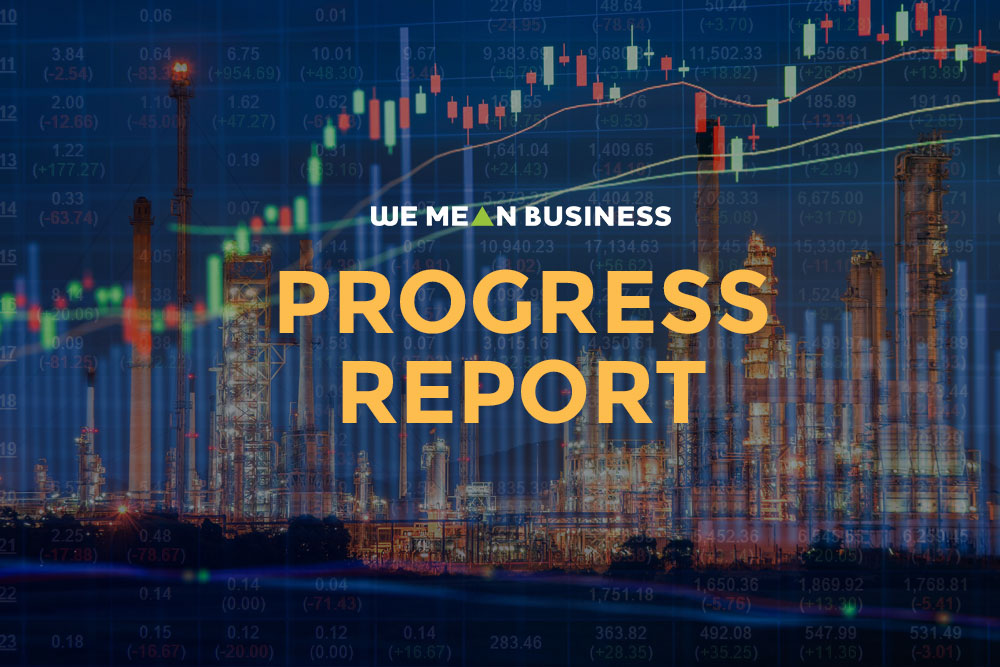Divestment movement and disclosure gather pace; China set to trade carbon
We Mean Business coalition
Welcome to the December edition of the We Mean Business Progress Report. This month has seen unprecedented momentum, spurred by President Macron’s One Planet Summit, which marked the 2nd anniversary of the Paris Agreement. We look at some of the key announcements around fossil fuel divestment, climate risk disclosure and China’s carbon trading scheme.
Divestment momentum
There were several key announcements marking the summit in Paris, from both business leaders and policy makers, including a focus on shifting capital away from the fossil fuel sector.
The World Bank Group announced it will no longer finance upstream oil and gas after 2019. The group also outlined various initiatives to drive its own decarbonization and mobilize finance for climate protection.
AXA, the world’s third largest insurance company, announced it is phasing out insurance coverage for new coal construction projects and oil sands businesses. It is also selling off €2.4 billion of coal investments and quadrupling its investments in sustainable energy and buildings by 2020, to €12 billion.
And Storebrand, Norway’s largest private pension fund, is expanding its fossil-fuel-free funds with a new clean bond programme for US$1.3 billion. This follows last month’s news that Norway’s $1 trillion sovereign wealth fund is considering divesting its holdings in international petroleum companies.
Climate finance
Alongside the growing divestment movement, the One Planet Summit also brought greater focus to the recommendations of the Task Force on Climate-related Financial Disclosures (TCFD).
To date, 237 companies, with a combined market capitalization of over US$6.3 trillion, have now publicly committed to support the TCFD. This includes over 150 financial firms, responsible for assets of over US$81.7 trillion.
BlackRock, the world’s biggest asset manager that oversees almost US$6 trillion in assets, sent letters to about 120 companies this week, urging them to report climate dangers in line with the recommendations of the TCFD.
Meanwhile, as part of the Climate Action 100+ initiative, global investors have launched a five-year bid to scale-up engagement with the world’s largest corporate greenhouse emitters to accelerate climate action.
The EU unveiled €9 billion of investment in Africa and the EU Neighbourhood region on sustainable cities, sustainable energy and connectivity, sustainable agriculture and rural entrepreneurs and agribusiness, as part of the EU External Investment Plan.
And UK Prime Minister Theresa May has announced the UK will give £140 million in new funding to help the world’s poorest communities adapt to the effects of climate change.
Game changer
Finally, China has taken its first steps towards implementing its much anticipated emissions trading system this month. The first stage of the launch will cover the country’s power generation plants and set emissions quotas for the whole sector. Considering the sector is responsible for about 3.3 billion tons of carbon emissions annually, the potential impact of the scheme is huge.
This month has also seen significant progress in the number of companies stepping up their efforts to tackle climate change. Around 1,200 companies now aim to have set a science-based target by the end of 2019. Of these, 328 major corporations have already set or committed to set science-based targets through the Science Based Targets initiative, while 864 additional companies declared their ambition to do so in their 2017 disclosures to CDP.
And two major French multinationals have made announcements. Schneider Electric committed to source 100% renewable electricity by 2030 through The Climate Group’s RE100 and joined EP100, to help on its overall journey towards carbon neutrality by 2030. And EDF Group has committed to transitioning to electric vehicles by 2030 through EV100, also from The Climate Group.

